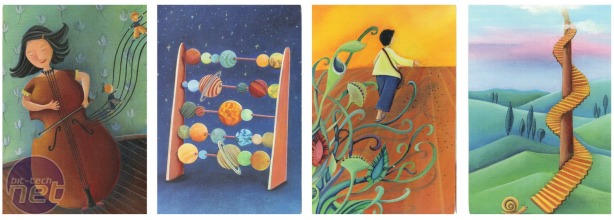
Dixit Review
Publisher: LibelludUK Price (as reviewed): £22.99 Incl. VAT
US Players (as reviewed): $24.99 Excl. Tax
Players: 3 - 6
A game of creativity and psychology, Dixit walks the middle ground between accessibility and deviousness by demanding that all the challenge is derived from the players, rather than the rules.
Here's how it works. A group of players gather around and take six cards each, every one of which has a weird image drawn on it that looks like the childish fever dreams of Salvador Dali. There are pictures of planet strung on an abacus; dragons saluting children and ladders which reach the clouds. Once these bizarre sights have been digested someone is elected as a storyteller and must present a tale based on a single card.
The story itself can be anything - a noise, the name of a film, an action or just a simple description. The best stories aren't too obvious, but nor are they impossibly abstract, as the other players must attempt to select a card of their own which conveys a similar message. These are then handed to the storyteller, who lays all the cards out on the table and challenges the other players to guess which was the original card he held.
It's here that Dixit's central conceit is unveiled and you can begin to see the psychological element that runs through the game. What would your opponent say when confronted with a picture of a cat attacking a goldfish in a crystal ball? You get points for every correct guess you make, but you also get awarded for cajoling others into selecting your card.
The result is that the most successful players are those who are able to find a balance between risky creativity and boring obviousness. The storyteller can't be too blatant, or everyone will guess their card and they'll get no points, but a similar punishment awaits those who are too vague. Dixit essentially rewards players who know their opponents well, with in-jokes and knowing giggles being a trademark of the game.
 It's not just the rule-structure which makes Dixit such an excellent title though, but also the production of the game itself. The art, while arguably a little childish at times, is both innocent and delightful, while the board (essentially a scoring track) is cleverly built into the box. Little wooden rabbits function as player pieces for some reason, fusing more bizarre character into the experience.
It's not just the rule-structure which makes Dixit such an excellent title though, but also the production of the game itself. The art, while arguably a little childish at times, is both innocent and delightful, while the board (essentially a scoring track) is cleverly built into the box. Little wooden rabbits function as player pieces for some reason, fusing more bizarre character into the experience. In fact, the only downside of Dixit is the limited number of cards and the constraints forced upon the game by the requirement for out-of-the-box thinking. Dixit isn't a game for small groups of fiercely logical people; it's best-suited to family play, where players of all ages and walks can get involved. It's just a shame that you'll likely end up seeing all the cards by the end of the second game, though revised editions and official variants such as Dixit Odyssey are available.
Dixit isn't what you'd call a 'hardcore' game; it doesn't have strategies or FAQs to read, or even a die to roll. What it does have though is a warmth and humour to it that invites players to bring their own fun to the table - and that makes it stand out in a genre which many would otherwise assume to be boring and stifling.

-
Overall90 / 100


MSI MPG Velox 100R Chassis Review
October 14 2021 | 15:04










Want to comment? Please log in.